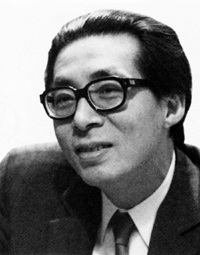- Kajiyama Toshiyuki
Infobox Writer
name = Toshiyuki Kajiyama

caption = Kajiyama Toshiyuki
birthdate = birth date|1930|1|2|df=y
birthplace =Seoul ,Korea
deathdate = death date and age|1975|11|11|1930|1|2|df=y
deathplace =Hong Kong
occupation = Journalist
genre = novels
movement =mystery novel ,spy novel
notableworks =
influences =
influenced =
footnotes =nihongo|Toshiyuki Kajiyama|梶山季之|Kajiyama Toshiyuki (
2 January 1930 –11 November 1975 was a novelist inShowa period Japan . He was known for his popular novels, primarilymystery novel s anderotic novel s.Early life
Kajiyama was born in
Keijo (present daySeoul ) in Japanese-occupied Korea, where his father was a civil engineer. He lived in Korea to the end ofWorld War II , when he was repatriated together with his parents to his father's home town of Hatsukaichi, inHiroshima Prefecture . He was a graduate of the Hiroshima Normal School (the predecessor toHiroshima University ). After graduation, he worked as aninvestigative reporter , and submitted short stories and small articles toliterary magazine s such as "Shukan Shincho" and "Shukan Bunshun".Literary career
In 1962, Kajiyama published his first novel, "Kuro no shisosha" (“The Black Test Model”), which he wrote in a documentary style. The novel was an all-time
best seller in Japan for several years, and started the genre of theindustrial espionage novel in Japan. The story involves two motor companies vying to produce a new sports car. The intense competition in the Japanese automobile industry causes the companies to resort to industrial espionage to gain an advantage. The protagonist of the story even sacrifices his girlfriend in order to beat the other company. However, eventually he realizes the futility of sacrificing his personal life for the uncaring corporation, which regards him as only a disposable cog in a huge machine. The novel was made into amotion picture by Daiei Motion Picture Company in 1962, directed byYasuzo Masumura . Its success was such that Daiei subsequently released ten more thriller-action films with similar themes, each using the word "black" in its title.However, few of Kajiyama's popular novels have been translated into English, and he is known more in the West for his works on
Korea under Japanese rule . Kajiyama was awarded theNaoki Prize , a prestigiousliterary prize , in 1963 for a work onKorea : "Richo zanei" ("Shadows of the Yi Dynasty”).Kajiyama died suddenly of
cirrhosis of theliver while at a hotel inHong Kong , where he was researching materials for a new book.After his death, his library was donated to the
University of Hawaii atManoa . Because of his background, Kajiyama was attracted both to the culture and people of Korea and the question of Japanese overseas migration. He collected more than 1,000 volumes of materials, some of which were classified documents of the Government-General of Korea in preparation of an epic on the history of Japanese migration, but the project was never completed due to his untimely early death.References and reading
*Kajiyama, Toshiyuki. "The Clan Records: Five Stories of Korea" translated by Yoshiko Dykstra。University of Hawaii Press (1995). ISBN 0-8248-1532-7
Wikimedia Foundation. 2010.
